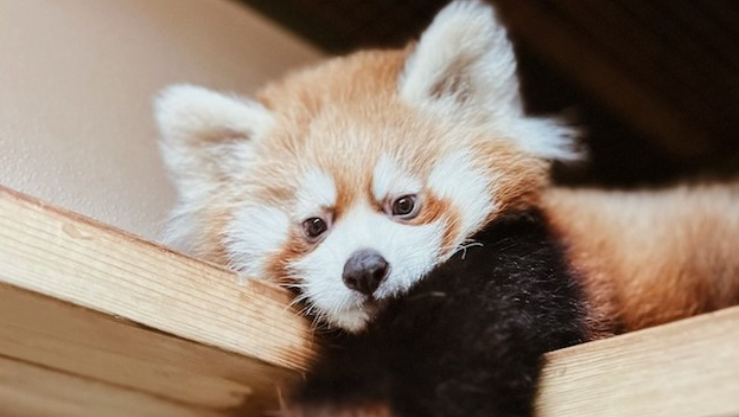The Toronto Zoo's red panda cub has died
 Baby Spice, or Dash, can be seen above. (thetorontozoo/Instagram)
Baby Spice, or Dash, can be seen above. (thetorontozoo/Instagram)
A red panda cub recently born to The Toronto Zoo died Sunday, the zoo confirmed.
In a release issued Monday, the zoo said Baby Spice, recently renamed ‘Dash’ after a public naming contest, showed no signs of illness as early as Saturday morning.
On Sunday morning, zoo staff found the cub vocalizing and lying on his side, “extremely weak.”
The panda was rushed to the Wildlife Health Centre where he was treated and briefly stabilized, before he stopped breathing and had no pulse.
“Resuscitation attempts were made but were unsuccessful,” the zoo said.
The zoo says a post-mortem exam was conducted to collect samples for additional testing, “which will be required to better understand the possible cause of his rapid decline.”
“Dash brought us keepers so much joy,” a statement issued by the panda’s keepers said.
“We enjoyed watching him grow and meet every milestone with gusto. [..] We are sad that our time with him was so short but we will cherish every moment we shared with him.”
Dash’s mother, Paprika, is being closely monitored, the zoo said.
RED PANDAS DIFFICULT TO BREED: ZOO
The zoo says the loss of Dash underscores the “fragility” of red panda cubs – even months after their birth.
They point to a high percentage of of early pregnancy loss in the species compared to others – 40 per cent of pregnancies being lost prior to birth as shown in a recent 10-year study by the Cincinnati Zoo.
Wild red panda cubs face similar mortality rates due to their vulnerable state at birth and the on-going anthropogenic pressures, according to the facility.
“Red pandas are a very complicated species and for several decades [the] Toronto Zoo did not have success with breeding them,” the zoo’s statement said, adding that, for the past 10 years, the zoo has been studying pregnancy-related hormone changes in an effort to better understand the lack of breeding success.
The zoo says they will be submitting the results of their findings in a scientific journal in an effort to add to the literature on red panda reproduction.
CTVNews.ca Top Stories

5 rescued after avalanche triggered north of Whistler, B.C. RCMP say
Emergency crews and heli-skiing staff helped rescue five people who were caught up in a backcountry avalanche north of Whistler, B.C., on Monday morning.
Quebec fugitive killed in Mexican resort town, RCMP say
RCMP are confirming that a fugitive, Mathieu Belanger, wanted by Quebec provincial police has died in Mexico, in what local media are calling a murder.
Bill Clinton hospitalized with a fever but in good spirits, spokesperson says
Former President Bill Clinton was admitted Monday to Georgetown University Medical Center in Washington after developing a fever.
Trump again calls to buy Greenland after eyeing Canada and the Panama Canal
First it was Canada, then the Panama Canal. Now, Donald Trump again wants Greenland. The president-elect is renewing unsuccessful calls he made during his first term for the U.S. to buy Greenland from Denmark, adding to the list of allied countries with which he's picking fights even before taking office.
UN investigative team says Syria's new authorities 'very receptive' to probe of Assad war crimes
The U.N. organization assisting in investigating the most serious crimes in Syria said Monday the country’s new authorities were “very receptive” to its request for cooperation during a just-concluded visit to Damascus, and it is preparing to deploy.
Pioneering Métis human rights advocate Muriel Stanley Venne dies at 87
Muriel Stanley Venne, a trail-blazing Métis woman known for her Indigenous rights advocacy, has died at 87.
King Charles ends royal warrants for Ben & Jerry's owner Unilever and Cadbury chocolatiers
King Charles III has ended royal warrants for Cadbury and Unilever, which owns brands including Marmite and Ben & Jerry’s, in a blow to the household names.
Man faces murder charges in death of woman who was lit on fire in New York City subway
A man is facing murder charges in New York City for allegedly setting a woman on fire inside a subway train and then watching her die after she was engulfed in flames, police said Monday.
Canada regulator sues Rogers for alleged misleading claims about data offering
Canada's antitrust regulator said on Monday it was suing Rogers Communications Inc, for allegedly misleading consumers about offering unlimited data under some phone plans.

































